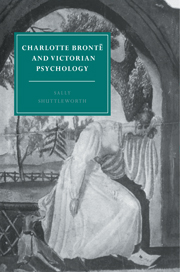Book contents
- Frontmatter
- Contents
- Acknowledgements
- Introduction
- PART ONE PSYCHOLOGICAL DISCOURSE IN THE VICTORIAN ERA
- PART TWO CHARLOTTE BRONTË'S FICTION
- 6 The early writings: penetrating power
- 7 The Professor: ‘the art of self-control’
- 8 Jane Eyre: ‘lurid hieroglyphics’
- 9 Shirley: bodies and markets
- 10 Villette: ‘the surveillance of a sleepless eye’
- Conclusion
- Notes
- Index
- CAMBRIDGE STUDIES IN NINETEENTH-CENTURY LITERATURE AND CULTURE
6 - The early writings: penetrating power
Published online by Cambridge University Press: 06 November 2009
- Frontmatter
- Contents
- Acknowledgements
- Introduction
- PART ONE PSYCHOLOGICAL DISCOURSE IN THE VICTORIAN ERA
- PART TWO CHARLOTTE BRONTË'S FICTION
- 6 The early writings: penetrating power
- 7 The Professor: ‘the art of self-control’
- 8 Jane Eyre: ‘lurid hieroglyphics’
- 9 Shirley: bodies and markets
- 10 Villette: ‘the surveillance of a sleepless eye’
- Conclusion
- Notes
- Index
- CAMBRIDGE STUDIES IN NINETEENTH-CENTURY LITERATURE AND CULTURE
Summary
Charlotte Brontë's early writings, which preoccupied her from early adolescence to her late twenties, lay the groundwork for the psychological concerns of her later fiction. We find here the same sense of embattled selfhood, shying away from interpretative penetration, the same concerns with the instabilities of psychological and gender identity, which fuel the later work. In these playful, unconstrained works we find expressed, in more direct and less mediated form than subsequently, the concerns of contemporary psychological debate. Like the Victorian alienists, Brontë is concerned with the realms of social and psychological excess; where they sought to delimit and define the boundaries of the normal, however, Brontë opens them up to interrogation.
The world Brontë creates in these early stories is one dominated by the power of the ‘penetrating’ and ‘scrutinous’ gaze, where the secrets of identity often lie in the hands of another, and the glittering eye of insanity is frequently displayed. Doubles, and alter-egos abound; and the boundaries of masculine and feminine identity are subject to constant questioning and dissolution. Charlotte's well known ‘Farewell to Angria’, in which she evinces her desire to ‘quit that burning clime where we have sojurned too long’ for a ‘cooler region where the dawn breaks grey and sober’, has led to the common misapprehension that all her early writing takes place amidst exotic climes in a heady atmosphere of emotional intensity.
- Type
- Chapter
- Information
- Charlotte Brontë and Victorian Psychology , pp. 101 - 123Publisher: Cambridge University PressPrint publication year: 1996



